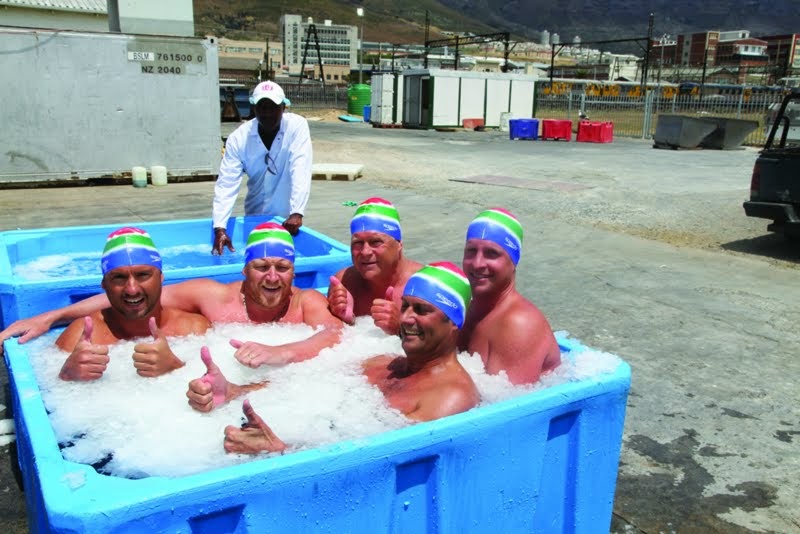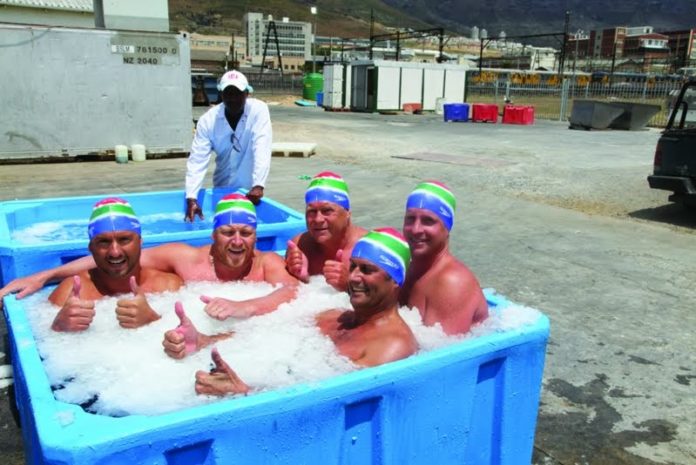
Ram Barkai and Andrew Chin are part of a group of extreme athletes who won the title of ‘World Open Water Swimming Performance of the Year’ for their treacherous 134km relay swim across the icy Bering Strait from Russia to the USA last year.
Ram and Andrew, along with their team mates Toks Viviers and Ryan Stramrood were among 66 swimmers who braved life-threatening conditions — including dangerously rough seas and a water temperature at times as low as 2 ̊C — to complete the world-first crossing by swimming 24 hours-a-day over six days in August 2013.
The Bering Strait Swim was up against 14 other extreme swims selected by the World Open Water Swimming Association (WOWSA) who said the winners’ challenge took place in ‘the harshest conditions possible’.
“The 86km [the actual distance, however due to currents, the swimmers completed 134km] relay was the sport’s most dangerous swim of 2013 with large ocean swells, heavy fog, stiff winds, relentless whitecaps, currents, and water temperatures between 2 ̊C and 8 ̊C.
“Man versus nature was never more one- sided in a swim that was always in danger of failure. For their belief in themselves, a commitment to an adventure with life- threatening situations, their ability to withstand 6 days of the harshest conditions possible, the swim is a worthy recipient of the award,” said global swimming icon, Steven Munatones, of WOWSA. The SA relay swimmers wore only Speedo briefs, a silicon cap and goggles.
Ram Barkai is the founder of the International Ice Swimming Association. “I have always been drawn to ice, snow, glaciers… their deadly beauty captured my imagination,” explains Ram. “I love challenges and I am a great believer that the human mind and spirit can take you places you never thought possible. The Jewish people have demonstrated that time and again in our history.”
Ram and Andrew divulge a few tips and tricks that help them endure such harsh conditions: “Firstly, do research — understand what you are getting into with a healthy dose of fear! Secondly, train physically — there are no shortcuts to physical fitness. Lastly, train your mind. Train under any conditions. Don’t let your fear control you. Even in bad weather, big waves, get in and do some training.”
Andrew describes some of the feelings they experience, both mental and physical, while doing extreme swimming: “The swim is about getting in and getting wet — this is hard — then it’s fine actually until your hands and toes start to feel like they are swelling. Then it’s out and the recovery begins — this is a painful experience as the blood flows back to the periphery. It’s three stages: before the swim, which is mental strength; the swimming, which is physical strength; and the recovery, which is painful.” Some of the dangers they face on a regular basis include “massive seas (5m waves) strong winds (60km) whirl pools, sharks, fog, language barriers and bad food!”
Besides for challenging themselves and breaking records, the team raises funds and awareness for the Seal Open Water Trust, and hope to inspire others to push themselves.
For those interested in getting involved in extreme swimming, Andrew advises that they “Come and swim with us in Camps Bay and let’s take it from there!”
In terms of plans for the future, Ram quips that the team are going to Antarctica soon “for a ‘beach holiday’ and will be attempting to swim a one mile swim in 0 ̊C temperatures.”
He concludes: “For whatever reason, the Cape Town Jewish community are very active and excel in the open water and cold water swimming. There are some great swimmers in our community — we are proud!”
Contact ram.iceswimming@gmail.com for more info.











